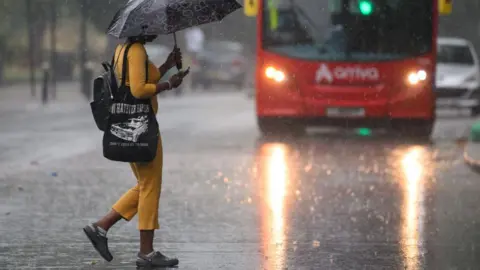**Staying Safe During Storms: Essential Tips for Preparation and Action**
As Storm Floris approaches the UK, the Met Office has issued alarming warnings regarding the unprecedented winds and flooding that accompany this weather event. An amber weather warning is currently active across much of Scotland, set to remain in effect until 23:00 BST on Monday. A yellow warning is also in place covering the northern regions of the UK, including North Wales and Northern Ireland, signaling significant potential dangers.
**Preparations Before a Storm**
In anticipation of severe weather, there are critical steps homeowners and residents can take to ensure safety. Firstly, secure any loose items in your yard, such as garden furniture, bins, ladders, and outdoor games, to prevent them from becoming projectiles in strong winds. Next, inspect your roof and fences to confirm that everything is sturdy, while also clearing gutters from debris to facilitate proper drainage.
If tree branches are hanging precariously or are loose, attempt to prune or remove them to reduce risk. Secure all windows and doors, fasten storm shutters if available, and park vehicles in a garage if possible. For those living in flood-prone areas, relocating valuable items to higher ground can avert considerable loss.
Moreover, familiarize yourself with how to turn off water, gas, and electricity supplies in case evacuation becomes necessary. Ensuring that critical devices, including mobile phones, are fully charged is wise too. It is advisable to gather important documents—such as proof of identity and insurance policy information—along with ensuring a sufficient supply of medication if necessary.
**Behavior During a Storm**
When faced with the fury of a storm, it is wise to remain indoors as much as possible and keep internal doors closed to maintain a safe environment. In preparation for potential power surges, unplug non-essential electrical items and keep a light on so you’re alert to when the power returns. If you absolutely must go outside, steer clear of buildings, trees, and walls as these may collapse under the strong winds.
Taking care of pets is another crucial aspect—ensure they are inside, provided with food, bedding, and fresh water. Always stay updated by monitoring local radio, TV broadcasts, and online platforms for severe weather warnings and emergency updates. Should you find yourself trapped by floodwaters, seek refuge in the highest possible point in the building. Attics may be risky, as they can become inaccessible if water rises, and leaving the building for the roof should be a last resort. In emergencies, remember to dial 999 for assistance.
**Power Cuts: What to Do?**
Power outages can be particularly distressing during severe weather. In the event that electricity is cut off, prioritize safety by turning off non-essential devices but leave at least one light on to signify when power resumes. Reporting the outage can be done easily via a free service by calling 105 or utilizing online platforms. Those with critical medical equipment may qualify for priority assistance by registering with their energy provider.
If there’s a gas smell indicative of a leak, act immediately by reporting it to 0800 111 999.
**Driving in Severe Weather Conditions**
Understandably, driving may be necessary, yet caution is paramount. If conditions are harsh, avoid travel unless absolutely essential. Stay away from flood-prone or exposed routes, employing strong vigilance particularly near high-sided vehicles. Keeping essential supplies—like food, water, blankets, and a flashlight—in your vehicle is wise, along with carrying a charged phone in case of emergencies.
While driving through poor visibility requires headlights or fog lights, doing so in accordance with insurance policies is crucial. Neglecting to heed dire weather warnings could impact claims should an incident occur.
**Post-Storm Actions**
Once the storm passes, property owners should be aware that most insurance policies cover storm damage. It is important to assess property conditions responsibly. Avoid putting yourself at risk or accessing fallen electrical wires until authorities have deemed it safe. Contact your insurer promptly to report any damage and heed their advice on next steps. You may make emergency repairs to prevent further damage, but keep all receipts for possible reimbursement.
Finally, understanding the boundaries of your property can prevent disputes regarding repairs, particularly where fences are concerned, as standard ownership does not always apply.
Storms can wreak havoc on property and pose severe physical dangers, but through preparation, cautious behavior during the event, and informed follow-up actions, you can protect yourself and your property, ensuring safety in uncertain times.












